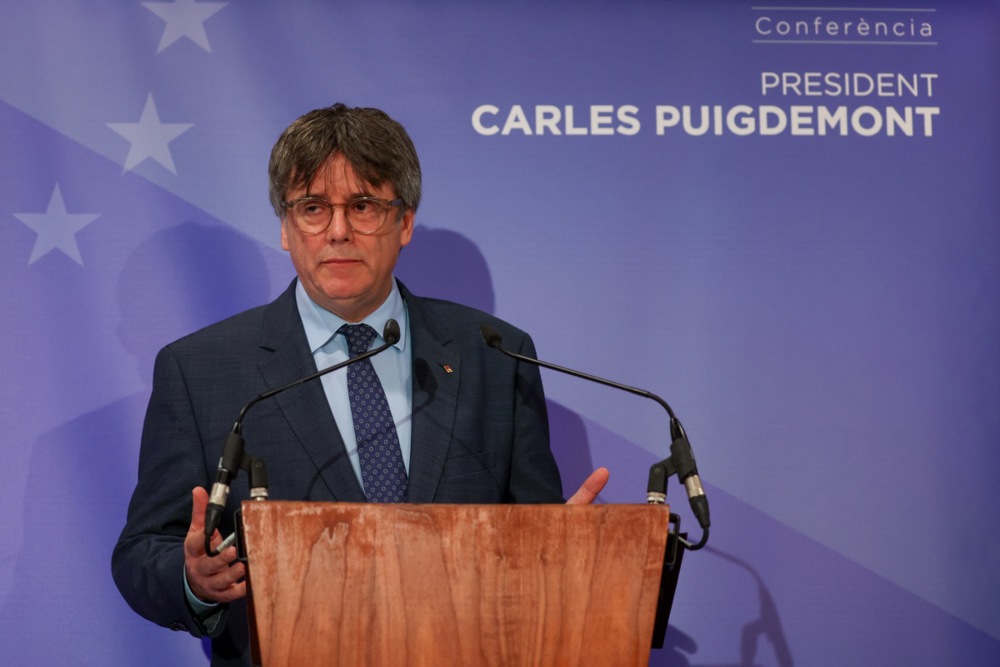More than 100,000 flag-waving Spaniards gathered in Madrid’s historic Plaza Colón (Columbus Square) on October 29.
They were protesting at Prime Minister Pedro Sánchez’s “defence” of the amnesty process for the convicted Catalonian separatists.
The leader of the Vox party Santiago Abascal and several civil society organisations gathered at noon on Sunday to support “Spain’s unity, its coexistence, its liberties” and “equality amongst Spaniards”.
That came after Vox recently sent a delegation to Brussels to denounce Catalan MEP Carles Puigdemont’s amnesty pretensions.
Vox presented a report to the 705 Members of the European Parliament titled “Amnesty to the Coup Ringleaders: History of an Illegitimate Constituent Process.” Fundación Disenso, the party’s influential think-tank, compiled the 34-page report.
The publication makes the case against the use of an amnesty law to pardon those convicted over the 2017 illegal referendum and declaration of independence in Catalonia.
Brussels Signal spoke with Jorge Martín Frías, Fundación Disenso’s director, to get the party line on a potential amnesty bill and its potential consequences in Spain and Europe:
Brussels Signal: Why bring the fight against Puigdemont to Brussels?
Frías: The European Union and its Member States need to be aware of what is about to happen in Spain.
The PSOE (Spanish Socialist Workers’ Party) is going to put an end to constitutional democracy with the passing of an amnesty law that has no place within our legal framework and the rule of law.
According to the Fundación Disenso report (that all 705 MEPs have a copy of): “The amnesty of the 2017 coup is unfounded and constitutes a serious violation of the principles of legality, equality before the law, and the separation of powers.”
How would Sánchez carry out a pardon if, according to your report, it does not fit within the Spanish legal framework?
Indeed, the amnesty is contrary to the Constitution. The government of Pedro Sánchez and the PSOE are subjecting the Spanish State to a process of “bolivarisation“.
That means they are trying to repeat in Spain what already occurred in Venezuela and other totalitarian regimes. They are capturing institutions and changing their intended purposes.
To carry out an unconstitutional law, they have made sure to fill the positions of the Constitutional Court. The Court is currently presided by a former Attorney General from a Socialist government.
It also includes, among other members, a former Minister of Justice from the PSOE – who stated in 2019 that amnesty for separatists “does not fit within the Constitution” – and a former high-ranking official from Moncloa (the Prime Minister’s Office).
In summary, they have prepared the institutions to give legal legitimacy to the interests of the PSOE. That entails a change in the regime that ends the Rule of Law as we know it.
How would this amnesty be different to the 1977 amnesty bill at the end of the Franco dictatorship?
That amnesty precedes the 1978 Constitution, the current fundamental law of Spain. It was part of the transition process from Franco’s regime to constitutional democracy.
There is nothing here that resembles it; it does not respond to a national interest, let alone to the coexistence among Spaniards.
So much so, that even all the PSOE’s Secretary-General and acting PM (Pedro Sánchez) and its spokespersons and ministers, have repeatedly said in parliament and during elections that “neither a referendum nor amnesty are possible, and not only because they are not part of the constitutional framework”.
The amnesty, then, is the attack on the rule of law that Sanchez must pay those who committed crimes of sedition and embezzlement, to be re-elected premier.
In September, the European Commission said regarding the amnesty of the separatists that “it is an internal matter for Spain that must be addressed within the constitutional”.
Later, European Commissioner for Justice Didier Reynders said the EC will be “following the evolution” of the negotiation process with the separatists and that it “will pay close attention matters relating to crimes related to the embezzlement of fund”.
Should Europe be more concerned about the current political situation in Spain?
Honestly, I have very little faith on what the Commission will do. So far, the Socialist and Communist government (let’s not forget that there are Communist members in the cabinet) has enjoyed the silence and the support of the Commission.
In fact, there is a double standard when compared to the treatment the Commission has given to governments like Hungary and Poland, with whom its leadership has shown a clear arbitrariness.
If the government manages to pardon the separatists, with a new amnesty bill, how would Vox react?
I am not a VOX leader, so I am not able to speak on behalf of the party that brought the coup plotters to justice. What I can say, though, is that I have no doubt that they will respond on all fronts: in Congress, in the courts, and on the streets.
Catalonia’s separatist parties have pushed for “the Scottish Way” as a model for a self-determination referendum. Do you think this will happen in the short term?
That is just more foolishness from the Catalan separatists.





